A young boy aspires to represent his nation one day on the cricket field. For that, he works hard day and night or has the natural talent to rise in the ranks of school and then first class cricket to finally be selected in the national team. He then either becomes a success or a failure, but if he is successful, he gains popularity and a certain standard of living which differs from other people. However, rare are those cricketers who are content with what they have gained out of playing cricket. They possess the desire for acquiring more and more of popularity and in particular money, which is the why they turn from good to bad in their profession.
Although there is nothing wrong in having a desire since it propels action which is the insignia of life, it is said that money is the root cause of evil. Cricketers, especially from developing countries where the economic growth is considerably low, stoop low in performing activities on the field even if it is against the same nation which has given him recognition. This is what the underworld or bookies have exploited the maximum for their own profits or some sort of satisfaction. Here are some of the incidents which have ashamed the game or players who have fallen into the trap over the years.
1) Mohammad Azharuddin (India) – The Most Corrupt Indian Cricketer
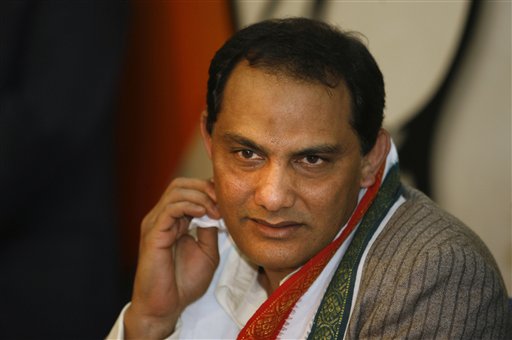
Mohammad Azharuddin was born in a staunch Muslim family in Hyderabad, which meant that he was bought up with sophistication and values which made him a humble person by the time he was in Indian colours. He was considered as one of India’s finest batsmen in both formats of the game as well as was the pioneer of making his team give importance to fielding, by setting an example himself with brilliant catches and run outs. Besides, he led India for the majority of the 90s, making them atleast capable of winning matches on a more frequent basis than in the past.
However, it is perhaps the fact that the salary earned those days by Indian cricketers that made Azharuddin frustrated from within and compelled him to take the unethical path despite being the leader of his country. Paul Condon, the ex-ICC Anti-Corruption Unit Chief recently stated that match fixing gained some spark in the 90s. Although there is no proof of this statement being true, he may have a point.
In that fateful 1996 World Cup semifinal between India and Sri Lanka at the Eden Gardens in Kolkata, Azharuddin won the toss and made a dubious decision to bowl first. Dubious because Azhar knew very well that the pitch was likely to deteriorate as the game went on, which would have made India’s task of chasing mountainous.
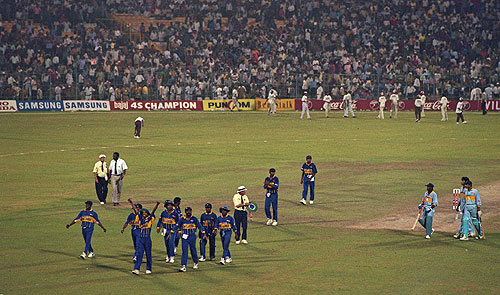
Although it is said that the decision to bowl first was taken on a team consensus, Vinod Kambli, one of the members of the team to have played this match, made allegations against Azhar not too long ago due to his strange tactics which apparently lost India the match and a golden opportunity to win the World Cup. Afterall. Azharuddin may have led the side on the field well to restrict Sri Lanka to 250 which was a par score, yet with the bat he had a horrible day and the rest struggled as well with only Sachin Tendulkar scoring a half-century.
Though it is still unclear what exactly happened in 1996, but that was the beginning of the end of the journey for him. A year later, on the tour of West Indies, Sachin Tendulkar replaced him as captain. It is not sure whether Azhar was happy with that decision from the board and performed miserably throughout the tour with Tendulkar confessing to possess a gut feeling that Azhar was one of the few players who he felt was not giving his 100% in even one session of play. This came in an interview with a famous reporter who asked him about match-fixing.
The demons finally were out in 2000 when Hansie Cronje, the then South African captain named Azharuddin to have been involved in ‘dirty’ activities alongside him, as Azhar was the one who introduced him to bookies who are said to be of Indian origin in 1996 itself during the team’s tour to India. That was the enough for the BCCI to impose a life ban on the Hyderabadi, effectively ending his career having played 99 Tests and scoring over 9000 ODI runs amongst the highlights.
Since Azharuddin was one of the senior most and influential members of the Indian team during the beginning of 2000 season, he could have been easily accessible and as a result another player, Ajay Jadeja was also found guilty in collaborating with him to underperform in some matches and he was banned for five years for being less involved in comparison.
Indian cricket was in shambles as every cricketer was interrogated by the Central Bureau of Investigation and all their houses were searched for evidence in their part in the scandal. Even the iconic Sachin Tendulkar were doubted due to his role as captain at the time this controversy came up, especially in the Test match against New Zealand at Ahmedabad in late 1999 when he shockingly did not impose the follow on, on the visitors despite having a lead of 275 runs and more than 4 sessions in hand to bowl them out. Eventually, the issue was put to the rest by the CBI itself after Tendulkar and then coach Kapil Dev stating that the bowlers were exhausted due to the humidity in Ahmedabad having bowled 141.4 overs and so to give them a rest, it was decided that India will bat again.
In the 1993-94 season as well, according to the Tehelka Magazine, all rounder Manoj Prabhakar was also alleged to have taken money from a bookie to score few runs in the slog overs of an ODI in Sri Lanka.
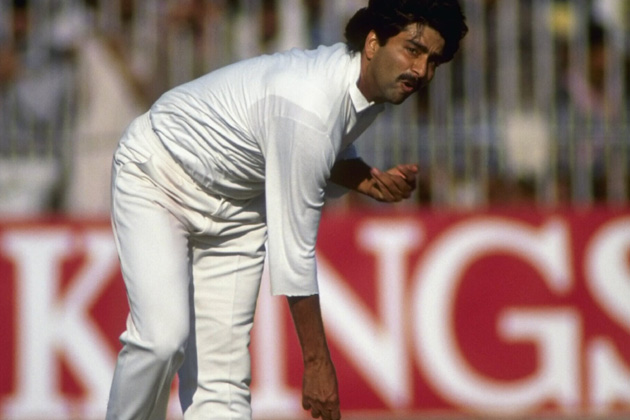
He vehemently denied it, but Prabhakar’s inconsistency with both bat and ball could be proof of the fact that Tehelka may have been correct.
2) Hansie Cronje of South Africa and the 2000 match fixing controversy
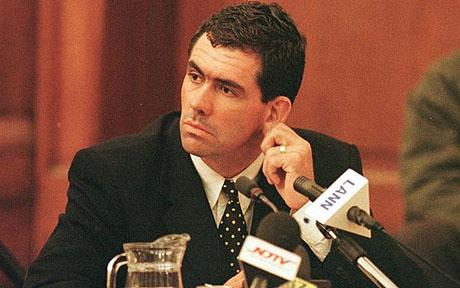
Hansie Cronje was considered squeaky clean by almost any person even slightly connected to cricket in the world. So much so that the first time he was accused of match-fixing in the ODI series in India, immediately his guide and South Africa’s influential and respected Dr. Ali Bacher jumped to his defence believing that false rumours should be not spread around related to him, for what he has done for South African cricket.
But proof was given through a news channel by the Delhi police in the form of a telephonic conversation between London-based Indian bookie Sanjiv Chawla and Hansie Cronje related to not exactly ‘match-fixing’ but predicting the events of the match in Nagpur through individual players. Herschelle Gibbs, the opening batsman was offered $15000 by Cronje on the bookies behalf to score less than 20 runs in that game. Henry Williams, the right arm fast bowler was also offered the same amount to concede more than 50 runs in the game. Gibbs and Williams wanted to be part of the plan, so they were fined 60,000 and 10,000 South African Rand respectively although Gibbs went to score 74 off 53 balls and Williams was injured in his second over, not bowling further in the match.
Nicky Boje and Pieter Strydom were two other cricketers named in the conversation. However, due to no evidence in their performances, both of them escaped without punishment. Cronje, on the other hand was caught red-handed in his confessions to follow as his tryst with match-fixing began in 1996 on incidentally the tour of India, where he asked his batsmen to lose their wickets quickly in the second innings of the final Test at Nagpur. They did, and for that Cronje received $50000 from the bookie, Mukesh Gupta who Azharuddin was acquainted with.
In the 1999 World Cup, Cronje became the first captain in world cricket to be seen wearing an earpiece which was meant for communication with anyone in the dressing room. It was eventually outlawed by the ICC due to fears of match-fixing on the spot and as a result the issued died down with coach Bob Woolmer also involved in handling it with the media.
But in the Centurion Test against England in January 2000, Cronje surprisingly forfeited the second innings after the second, third and fourth day’s play were washed due to rain, with England set a target of 249 to win. England went to win, and Cronje was initially applauded for his bravery to play for a result rather than a draw. However, bookie Marlon Aronstam had offered him 500,000 Rand to instigate a result in the game so that he did not suffer losses because of a draw. Though that amount was eventually not given to him, he did however get 50,000 Rand and a leather jacket as a gift which Aronstam had promised he would give Cronje if not the money.
Hansie Cronje was banned for life and as it is written the scriptures that you pay the price for every action you perform, Cronje did.
Hansie Crojne died in 2002 in a plane crash, thereby gaining sympathy amongst some South Africans and cricket fans but ending in the ‘Hall of Shame’ despite being one of the most successful leaders South Africa ever had since their readmission into international cricket in 1992.
3) Salman Butt, Mohammad Amir and Mohammad Asif (Pakistan)
The 3 Pakistani Cricketers turned Crooks who brought down Cricket to it’s lowest level
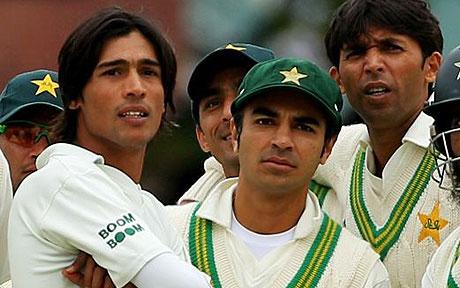
It was 18 months ago that Pakistan cricket had hit its rock bottom. Many were aware about the team’s eternal relationship with match-fixing due to cricketers such as Salim Malik and Ata-ur-Rehman banned for life and big names such as Wasim Akram, Waqar Younis, Rashid Lalif and Moin Khan accused of their involvement in it in the 90s, more importantly in the 1999 World Cup group game against Bangladesh which they surprisingly lost.
But they were now informed about a bigger and much dangerous phenomenon called ‘spot-fixing’. Spot fixing is when particular events of the match are fixed, such as the first ball of the match being a wide or the third ball of the second over would be a dot ball. Unlike match fixing, which involves fixing a match altogether through individual performances till the end. Thus, spot fixing has helped bookmakers around the world bet more and hence increased their chances of making more money than before.
The trio mentioned above fell for the lure of money, in the process betraying their fans or people who came to watch the matches in England hoping it would be a fair contest. And not to mention, their country which had high expectations from them due to their talent as Butt, Asif and Amir were said to be the key in Pakistan getting back to the top of the ODI and Test rankings in the near future.
Salman Butt reminded many of Saeed Anwar, but was a much elegant player when it came to playing drives off the front foot on the off side and used his wrists beautifully to play on the on side. His rise was as high as his fall. So much so that Butt was appointed as a regular Test captain of Pakistan from the second Test onwards against Australia at Leeds in July 2010, after Shahid Afridi’s retirement after playing a solitary match on his return. The tenure started off in grand fashion, as Pakistan beat Australia to level the 2 Test series 1-1.
However, Butt seemed to have been so buoyed by the victory and his position in the team that he turned dirty. He was definitely at the centre of the Lord’s controversy since as captain he asked Mohammad Asif and Mohammad Amir to bowl no-balls at those stages of the match as required by his so-called ‘agent’ but now known bookie Mazhar Majeed. Credit has to be given to the now defunct News of the World’s journalist Mazhar Mahmood to have covered these events secretly.
Butt had clearly misused his powers as captain, taking advantage of the young and then 18 year old Mohammad Amir who had no choice but to follow his orders otherwise he could have been sacked from the team even without reason. As a result, the ICC banned him for effectively 10 years of international cricket, which means that he does not possess the slightest chance of a comeback. While the Southwark court in London sent him to jail for a period of 30 months in November 2011 for accepting corrupt payments from Majeed, that to on the pretext of a sports deal and attending an opening of an ice cream parlour in the city during the Oval Test. He was also accused of batting out a maiden over of England off spinner Graeme Swann in that Test; although Pakistan went on to win the match.
Mohammad Amir can be sympathized with to an extent due to the mental pressure he was put into in order to accept the offer. He comes from a poor family and is not well educated anyway. But that is no excuse to betray the country through which he made a name for himself as one of the world’s topmost bowler and not just an emerging talent. If he was clever enough, he would have been covert in informing the team manager about such an offer and he could have helped his team and the ICC in actually opening the can of worms. But instead he gave in and sucked into it. The youngster was also accused of carrying a mobile phone for some unknown reason in the dressing room during an Asia Cup match in 2010, a month prior to the tour of England when the ICC rules state that they are prohibited from being used.
As a result, Amir was banned for 5 years by the ICC and instead of being jailed in London, he was transferred into a what could be called a ‘juvenile home’ due to his age since there is a scope of improvement in him. He can make a return into international cricket in the year 2016 but for that, he would have to work extremely hard and be cautious of the environment around him since he cannot play any form of cricket. It is doubtful though whether he will be seen again, and if he will be, will he be the same bowler again? Will Pakistan then still have the public support as they have now? These questions are surely asked for a cricketer involved in a wrong doing.
Mohammad Asif though according to me, deserved to be punished the most out of all the three. He had been caught taking banned drugs during the 2006 ICC Champions Trophy in India along with Shoaib Akhtar and in the IPL 2008, due to which he was prohibited from entering the UAE. Come 2011 and Asif went one step further and was actually involved in spot-fixing when he along with Amir bowled no-balls deliberately with England batsmen Andrew Strauss and Jonathan Trott batting at the crease. Being one of the experienced bowlers of the team, he had to face a huge punishment from the ICC. He has been banned for 7 years of international cricket, and being 27, that Test has to be the last of his career. Besides, like Butt, he has been put in prison for 30 months in England.
While the bookie Mazhar Majeed who was said to be the agent of several players was proven guilty of his role in fixing not just the Lords Test, but also the Sydney Test of 2010 which Pakistan lost after having a first innings lead of above 200 against Australia. He also wanted players such as Salman Butt and Kamran Akmal to be involved in this business starting from the World T-20 in 2009, which means that some matches or events could have been fixed during the tournament. Majeed has also been jailed, but for 32 months.
There are several high-profile match fixing cases, although minor ones. One of them is West Indies’ Marlon Samuels, who was caught by the police in giving out vital team information to bookmaker Mukesh Kochhar prior to the Ahmedabad ODI during the team’s tour to India in early 2007 in a hotel room conversation. Subsequently, he was banned from playing international cricket for 2 years and the issue only died down when he returned to play in the national side recently.
So, it is not just Pakistan, the plague of match-fixing and spot-fixing is prevalent across the cricketing world. Every human being has an intellect, which is the faculty to reason and think independently of the actions they should commit. Unfortunately, the moment money and gifts come into a discussion, players can lose their reasoning and fall for emotion, and so as you can see they have paid the price for it. This is why tournaments such as the IPL and the nature of the T-20 format pose a real threat to the integrity of the game, since this is a playground for bookies to bet to the highest levels.
Players have to realize that they play for their country first, and then themselves. If they play well, they will surely be rewarded for their consistent performances. Plus, they are role models for youngsters who grow up watching cricket, believing that their heroes deserve to be called heroes. Educating cricketers about the dangers of match-fixing or offering cricketers amnesty just as England has done off late, is not going to be beneficial in the long-term. The role of the administration as well as the team management is a must in ensuring that players remain a happy bunch, enjoying their cricket while at the same time, fulfilling their needs to the fullest.
Only the good can defeat evil, and perhaps it is high time cricketers learn something from superhero movies to ensure that this malice is atleast reduced drastically, if not put to a full stop.

Leave a Reply